| Listing 1 - 10 of 56 | << page >> |
Sort by
|
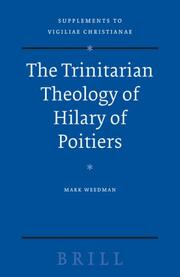
ISBN: 128193674X 9786611936747 9047431278 9789047431275 9789004162242 9004162240 Year: 2007 Publisher: Leiden ; Boston : Brill,
Abstract | Keywords | Export | Availability | Bookmark
 Loading...
Loading...Choose an application
- Reference Manager
- EndNote
- RefWorks (Direct export to RefWorks)
When Hilary of Poitiers was exiled from his native Poitiers in Gaul to Cappadocia, his entire theological sensibility changed. The Latin bishop, schooled in the tradition of Tertullian and Novatian, became a full-throated participant in the Trinitarian controversies of his time. This book offers a new reading of Hilary’s Trinitarian theology that takes into account the historical context of Hilary’s thought. It first examines this context and the course of Hilary’s engagement with his Homoian opponents. It then turns to the key themes of Hilary’s theology as he worked them out in that context. The result is a work that not only helps clarify Hilary’s theology, but that offers new insight into the Trinitarian controversies as a whole.
Trinity --- Homoousian controversy. --- History of doctrines --- Hilary,
Book
ISBN: 9783035109108 9783034316910 Year: 2016 Publisher: Bern Peter Lang
Abstract | Keywords | Export | Availability | Bookmark
 Loading...
Loading...Choose an application
- Reference Manager
- EndNote
- RefWorks (Direct export to RefWorks)
Homoousian controversy. --- Trinity --- Arianism. --- Church history --- History of doctrines --- Hilary,
Book
ISSN: 01722093 ISBN: 3531072684 3322855007 9783531072685 Year: 1984 Volume: G268 Publisher: Opladen: Westdeutscher Verlag,
Abstract | Keywords | Export | Availability | Bookmark
 Loading...
Loading...Choose an application
- Reference Manager
- EndNote
- RefWorks (Direct export to RefWorks)
Arianism --- Visigoths --- West Goths --- Goths --- Antitrinitarianism --- Christian heresies --- Homoousian controversy --- Religion --- History --- Spain --- Church history.
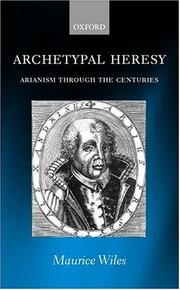
ISBN: 1281989304 9786611989309 0191520594 9780191520594 0199245916 9780199245918 0198269277 9780198269274 9780191600814 0191600814 Year: 1996 Publisher: Oxford : New York : Clarendon Press ; Oxford University Press,
Abstract | Keywords | Export | Availability | Bookmark
 Loading...
Loading...Choose an application
- Reference Manager
- EndNote
- RefWorks (Direct export to RefWorks)
Arianism --- Antitrinitarianism --- Christian heresies --- Homoousian controversy --- History. --- History --- Christian theology --- Arius
Book
ISBN: 0232516928 Year: 1987 Publisher: London Darton
Abstract | Keywords | Export | Availability | Bookmark
 Loading...
Loading...Choose an application
- Reference Manager
- EndNote
- RefWorks (Direct export to RefWorks)
273.4 --- Arianism --- Antitrinitarianism --- Christian heresies --- Homoousian controversy --- Arianisme --- History --- Arius --- Arianism. --- Arius, --- 273.4 Arianisme --- Areios, --- Ario,
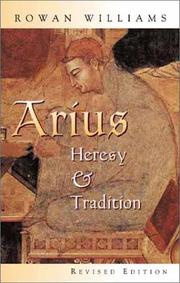
ISBN: 0802849695 9780802849694 Year: 2002 Publisher: Grand Rapids: Eerdmans,
Abstract | Keywords | Export | Availability | Bookmark
 Loading...
Loading...Choose an application
- Reference Manager
- EndNote
- RefWorks (Direct export to RefWorks)
#GGSB: Dogmatiek --- #GGSB: Godsleer --- Arianism --- Antitrinitarianism --- Christian heresies --- Homoousian controversy --- History --- Arius, --- Areios, --- Ario, --- Arianism. --- Dogmatiek --- Godsleer
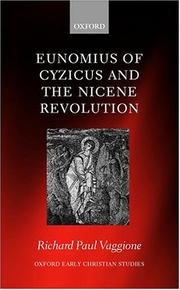
ISBN: 0198146787 9780198146780 Year: 2000 Publisher: Oxford: Oxford university press,
Abstract | Keywords | Export | Availability | Bookmark
 Loading...
Loading...Choose an application
- Reference Manager
- EndNote
- RefWorks (Direct export to RefWorks)
The study of 'Arianism' has proved one of the abiding fascinations and the abiding problems of early Christian studies in recent years. Here, Vaggione addresses the definition of the doctrine and why it generated such intense social turmoil by examining the standpoint of one of 'Arianism's' principal supporters, Eunomius of Cyzicus. Eunomius' life is used as a framework within which to discuss changes in the doctrine of the Trinity.
Arianism. --- Arianisme --- Eunomius, --- Arianism --- 273.4 --- Antitrinitarianism --- Christian heresies --- Homoousian controversy --- History --- Eunomius Bp. of Cyzicus --- 273.4 Arianisme --- Eunomio, --- Eunomios, --- Eunomius ep. Cyzicensis
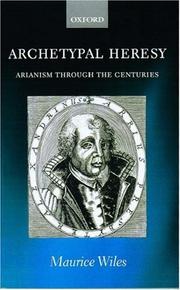
ISBN: 0198269277 Year: 1996 Publisher: Oxford : Clarendon press,
Abstract | Keywords | Export | Availability | Bookmark
 Loading...
Loading...Choose an application
- Reference Manager
- EndNote
- RefWorks (Direct export to RefWorks)
273.4 --- Arianism --- -273.4 Arianisme --- Arianisme --- Antitrinitarianism --- Christian heresies --- Homoousian controversy --- History --- Hérésies chrétiennes --- Histoire --- 273.4 Arianisme
Book
ISBN: 0813211697 9780813211695 Year: 2001 Publisher: Washington, D.C. : Catholic University of America Press,
Abstract | Keywords | Export | Availability | Bookmark
 Loading...
Loading...Choose an application
- Reference Manager
- EndNote
- RefWorks (Direct export to RefWorks)
Arianism. --- Trinity. --- Theology --- Antitrinitarianism --- Christian heresies --- Homoousian controversy --- Theology, Doctrinal --- Triads (Philosophy) --- Appropriation (Christian theology) --- God (Christianity) --- Godhead (Mormon theology) --- Holy Spirit --- Trinities --- Tritheism --- History
Book
ISSN: 05534003 ISBN: 9783110251548 9783110251555 3110251558 1283400073 9786613400079 311025154X Year: 2011 Volume: 66 Publisher: Berlin ; New York : De Gruyter,
Abstract | Keywords | Export | Availability | Bookmark
 Loading...
Loading...Choose an application
- Reference Manager
- EndNote
- RefWorks (Direct export to RefWorks)
Während des sog. zweiten Reichs der Burgunder an der Rhône (etwa 443 bis zur Eroberung durch die Franken 534) entstand eine selbständige burgundische, "arianisch"-homöische Reichskirche. Das führte zu Auseinandersetzungen, aber auch zu einem intensiven theologischen Austausch mit der überwiegend nizänischen gallo-römischen Bevölkerung. Besonders das Werk des Bischofs Avitus von Vienne, seine reichhaltige Korrespondenz, theologischen Fragmente und Homilien geben einen unmittelbaren Einblick in die Zeit. Die Monographie führt in die Geschichte des Reichs der Burgunder ein und bietet erstmals ausgewählte Briefe und Fragmente des Avitus mit deutscher Übersetzung und Kommentierung. Im Mittelpunkt steht der theologische Austausch mit dem burgundischen König Gundobad. Die Briefe und Fragmente weisen auf kirchenorganisatorische Probleme hin - ob z.B. Kirchengebäude der "Arianer" genutzt werden können - sowie auf Religionsgespräche und theologische Diskussionen, besonders über den heiligen Geist (filioque). Es wird erstmals genauer beschrieben, was "arianisch" zu jener Zeit in Burgund bedeutete im Unterschied zu den gleichzeitigen theologischen Debatten im Reich der Vandalen.
Avitus, --- Burgundy (Kingdom) --- Homoousian controversy --- Church history --- 273.4 --- 27 <44> --- Arianisme --- Kerkgeschiedenis--Frankrijk --- 273.4 Arianisme --- Avitus, Alcimus Ecdicius, --- Avit, --- Alcimus Ecdicius Avitus, --- Bourgogne (Kingdom) --- Arles (Kingdom) --- Church history. --- Arianism --- Avitus ep. Viennensis --- Avitus, - Saint, Bishop of Vienne --- Burgundy (Kingdom) - Church history --- Homoousian controversy - Burgundy (Kingdom) --- Arian Controversy. --- Avitus of Vienne. --- Burgundian. --- Church History. --- Migration Period.
| Listing 1 - 10 of 56 | << page >> |
Sort by
|

 Search
Search Feedback
Feedback About UniCat
About UniCat  Help
Help News
News